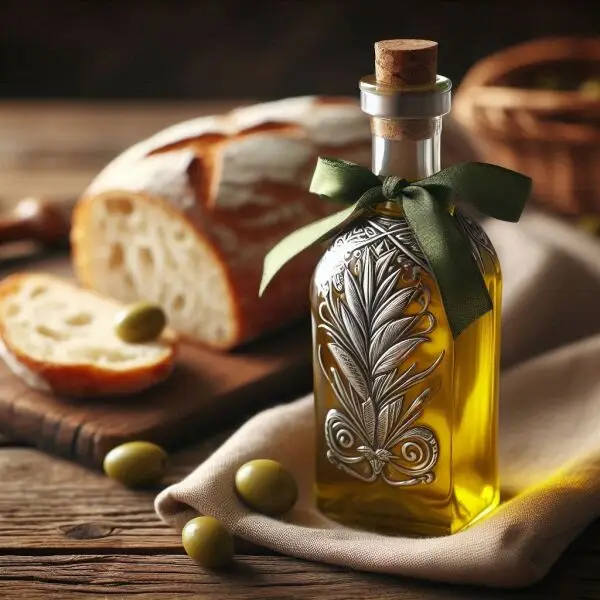5 Foolproof Techniques to Recognize Quality Olive Oil
Discover 5 foolproof techniques to identify high-quality olive oil and learn about the characteristics that make it superior. Improve your choice!...
Table of Contents
- The Variability of Extra Virgin Olive Oil
- The Impact of Neuromarketing on the Perception of Oil
- Key Factors to Identify Quality Olive Oil
- Demystifying the Kitchen Refrigerator Test
Follow Patricia Alegsa on Pinterest!
The Variability of Extra Virgin Olive Oil
Not all extra virgin olive oils are equal in terms of quality and flavor. Although the label "extra virgin" may suggest superior quality, this designation does not always guarantee that the product meets the expectations of all consumers.
An olive oil may meet the technical standards to be considered extra virgin, but its flavor and perceived quality can vary significantly depending on factors such as the origin of the olives, the extraction process, and, above all, the individual tastes of each person.
The term "extra virgin" indicates that the oil has been obtained directly from olives and only through mechanical processes, in addition to meeting certain parameters of acidity and flavor. However, within this category, there is a wide range of flavors and qualities that can influence the consumer's choice.
In a competitive market, neuromarketing has become a key tool for influencing consumers' purchasing decisions. This discipline studies how subconscious factors, such as packaging design or product color, affect our perception of quality.
The term "extra virgin" indicates that the oil has been obtained directly from olives and only through mechanical processes, in addition to meeting certain parameters of acidity and flavor. However, within this category, there is a wide range of flavors and qualities that can influence the consumer's choice.
The Impact of Neuromarketing on the Perception of Oil
In a competitive market, neuromarketing has become a key tool for influencing consumers' purchasing decisions. This discipline studies how subconscious factors, such as packaging design or product color, affect our perception of quality.
In the case of olive oil, neuromarketing plays a crucial role in altering how we perceive its quality, even before tasting it.
Olive oil producers use neuromarketing strategies that include attractive bottle designs and an intense green color, which is often associated with freshness and quality.
Olive oil producers use neuromarketing strategies that include attractive bottle designs and an intense green color, which is often associated with freshness and quality.
However, these characteristics can be manipulated and do not necessarily reflect a higher quality of the oil.
Where NOT to store olive oil to preserve its nutritional properties.
To choose a high-quality olive oil, there are several factors that consumers should take into account. First of all, the label is crucial: it must clearly indicate that it is "extra virgin" and specify its origin.
Where NOT to store olive oil to preserve its nutritional properties.
Key Factors to Identify Quality Olive Oil
To choose a high-quality olive oil, there are several factors that consumers should take into account. First of all, the label is crucial: it must clearly indicate that it is "extra virgin" and specify its origin.
High-quality European oils, such as those bearing the Protected Designation of Origin (PDO) seal, usually undergo stricter quality controls.
Another important aspect is the freshness of the oil. Ideally, it should be consumed within two years following the harvest, so it is advisable to check the harvest date on the label. Furthermore, a good oil should be clear and clean, with a fresh aroma and a balanced taste, characteristics that indicate its quality and freshness.
Olive oil to fight cholesterol
One of the popular tests to evaluate the quality of olive oil is the "refrigerator test," which involves chilling the oil and observing its consistency. However, this method is not reliable.
Another important aspect is the freshness of the oil. Ideally, it should be consumed within two years following the harvest, so it is advisable to check the harvest date on the label. Furthermore, a good oil should be clear and clean, with a fresh aroma and a balanced taste, characteristics that indicate its quality and freshness.
Olive oil to fight cholesterol
Demystifying the Kitchen Refrigerator Test
One of the popular tests to evaluate the quality of olive oil is the "refrigerator test," which involves chilling the oil and observing its consistency. However, this method is not reliable.
Although high-quality oils may thicken at low temperatures, many oils, regardless of their quality, can show these same signs. Therefore, this test should not be considered an effective way to judge the quality of olive oil.
In conclusion, when choosing extra virgin olive oil, it is essential to consider not only the label but also its freshness, clarity, and aroma.
In conclusion, when choosing extra virgin olive oil, it is essential to consider not only the label but also its freshness, clarity, and aroma.
Education around these aspects can help consumers make more informed decisions and enjoy a product that truly meets their expectations for quality and taste.
Subscribe to the free weekly horoscope
Aquarius Aries Cancer Capricorn Gemini Leo Libra Pisces Sagittarius Scorpio Taurus Virgo
-
 Can rapamycin be the key to longevity? Find out more
Can rapamycin be the key to longevity? Find out more
Discover how rapamycin, an immunosuppressant, could be the key to delaying aging. Researchers explore its potential in longevity. -
 Colon cancer diagnosis is increasing in young people: ultra-processed foods under suspicion
Colon cancer diagnosis is increasing in young people: ultra-processed foods under suspicion
Colon cancer is increasing in people under 50: diet and ultra-processed foods under scrutiny. Experts warn: current habits increase the risk. -
 Extreme Challenge: Influencer Ate 24 Eggs Daily and Revealed His Cholesterol
Extreme Challenge: Influencer Ate 24 Eggs Daily and Revealed His Cholesterol
Nick Norwitz ate 24 eggs daily for a month to analyze their impact on cholesterol, challenging WHO recommendations. Surprise! -
 How to Preserve Avocado: Techniques to Maintain Its Freshness
How to Preserve Avocado: Techniques to Maintain Its Freshness
Discover simple and effective techniques to preserve the freshness of fruits rich in healthy fats and vitamins, and enjoy their benefits for longer. -
 The avocado seed: how to eat it and health benefits
The avocado seed: how to eat it and health benefits
Discover the little-known health benefits of avocado seeds and how to make the most of them.
I am Patricia Alegsa
I have been writing horoscope and self-help articles professionally for over 20 years.
Subscribe to the free weekly horoscope
Receive weekly in your email the horoscope and our new articles on love, family, work, dreams and more news. We do NOT send spam.
Astral and numerological analysis
-
 Discover your future, secret personality traits and how to improve in love, business and life in general
Discover your future, secret personality traits and how to improve in love, business and life in general
-
 Online Dream Interpreter: with artificial intelligence
Do you want to know what a dream you had means? Discover the power of understanding your dreams with our advanced online dream interpreter using artificial intelligence that responds to you in seconds.
Online Dream Interpreter: with artificial intelligence
Do you want to know what a dream you had means? Discover the power of understanding your dreams with our advanced online dream interpreter using artificial intelligence that responds to you in seconds.
-
 Effective Strategies to Improve Depression
Effective Strategies to Improve Depression
Discover the exclusive strategies to understand and effectively support those living with this illness. Get informed now! -
 Incredible: At-home brain stimulation therapy alleviates depression
Incredible: At-home brain stimulation therapy alleviates depression
New at-home brain stimulation therapy, tested by King’s College London, offers hope to those who do not improve with medication or psychotherapy. -
 The hidden function of your washing machine that saves energy and cares for your clothes
The hidden function of your washing machine that saves energy and cares for your clothes
Discover the hidden function of the washing machine that saves up to 50% energy and ensures clean clothes. Optimize your consumption and take care of your wallet! -
 You should stop cooking with aluminum foil: it's toxic!
You should stop cooking with aluminum foil: it's toxic!
You should stop cooking with aluminum foil and I'll explain why in this article. Also tips for replacing it. -
 Washing your feet with lemon: improves circulation, relaxes, fights foot odor
Washing your feet with lemon: improves circulation, relaxes, fights foot odor
Discover why washing your feet with lemon and warm water improves circulation, relaxes, fights foot odor, and revitalizes your well-being. -
 Why is it harder to recover after the age of 40?
Why is it harder to recover after the age of 40?
Discover why it's harder to recover at 40: the body ages, and a bad night or flu affects it more. Science explains it! -
 How to Return to Eating Meat if You Were Vegetarian
How to Return to Eating Meat if You Were Vegetarian
An Argentine actress, Agustina Cherri, has returned to eating meat after 16 years of being vegetarian. Discover expert advice on how to do it healthily. -
 What does it mean to dream of galaxies?
What does it mean to dream of galaxies?
Discover the fascinating world of dreams with our article What does it mean to dream of galaxies? Explore the mysteries of the universe and its relationship to your life. -
 Incredible revelations about this Egyptian mummy
Incredible revelations about this Egyptian mummy
New research reveals secrets about Egypt's famous remains. Experts suggest that her tragic death could unveil an ancient enigma. -
 What does it mean to dream of fossils?
What does it mean to dream of fossils?
Discover the fascinating world of dream interpretation with fossils. Learn what secrets your subconscious hides and how to interpret your dreams. read now! -
 10 Expert Morning Habits Backed by Harvard Studies
10 Expert Morning Habits Backed by Harvard Studies
10 Expert Morning Habits to Boost Your Emotional Well-Being. Harvard studies suggest that a regular routine provides the brain with a sense of security and focus. -
 Your life is not bad, it can be incredible: what to do according to your Zodiac sign
Your life is not bad, it can be incredible: what to do according to your Zodiac sign
Do you feel like your life is going downhill? Discover what might be happening according to your sign and find reasons not to lose hope. -
 Awaken your creativity: keys to reconnect internally
Awaken your creativity: keys to reconnect internally
Boost your creativity and overcome the blockage. Discover effective solutions to unleash your potential. Take off towards innovation!